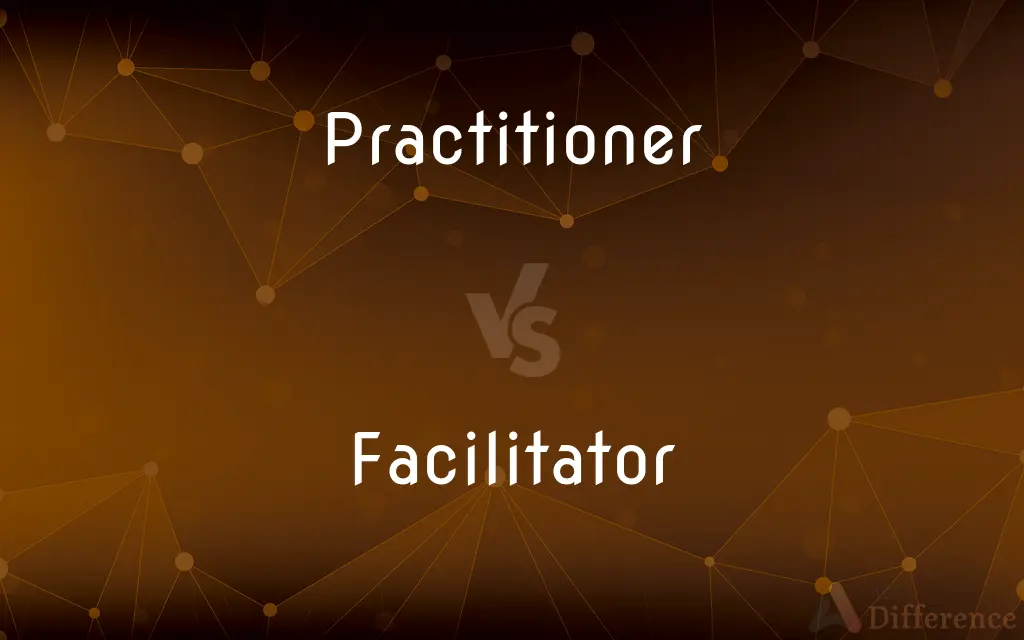Practitioner vs. Facilitator — What's the Difference?
By Tayyaba Rehman & Urooj Arif — Updated on April 15, 2024
Practitioners directly apply their expertise in a specific field, often in healthcare or law, while facilitators guide processes and discussions in groups without providing direct input.

Difference Between Practitioner and Facilitator
Table of Contents
ADVERTISEMENT
Key Differences
Practitioners are professionals who actively engage in the practice of a particular profession, typically within fields that require specialized knowledge and skills, such as medicine, law, or therapy. On the other hand, facilitators focus on making processes easier or more productive for groups, often in educational or organizational contexts. They do not necessarily contribute content but help manage the flow of discussion or activity.
In the medical field, a practitioner, such as a doctor or nurse, directly treats patients, using specialized knowledge to diagnose, treat, and manage diseases. Whereas a facilitator in healthcare might lead a support group or a workshop, focusing on enabling communication and support among participants rather than providing medical advice or treatments.
Practitioners often have formal qualifications and are recognized by professional bodies, which certify their expertise and adherence to specific ethical standards. Facilitators, however, might not need such specific professional qualifications; their skills are usually related to leadership, communication, and conflict resolution.
While practitioners are directly accountable for the outcomes of their professional actions, facilitators are generally responsible for the process and its smooth execution. They ensure that all group members participate and that outcomes are achieved collaboratively.
In education, a practitioner, such as a teacher or educational therapist, directly engages with students, imparting knowledge and skills. On the other hand, a facilitator in an educational setting might coordinate a group project or workshop, helping students to explore ideas and find solutions collectively rather than instructing them directly.
ADVERTISEMENT
Comparison Chart
Role
Directly applies professional skills
Guides processes and discussions
Fields
Healthcare, law, education
Business, education, therapy
Qualifications
Professional degrees, licenses
Often trained in communication, leadership
Accountability
Accountable for professional outcomes
Responsible for process management
Primary Focus
Providing direct services or interventions
Ensuring effective group dynamics and outcomes
Compare with Definitions
Practitioner
In academics, practitioners bring real-world experience to their teaching.
The practitioner shared practical marketing strategies with her students.
Facilitator
A person who helps a group to understand their common objectives and assists them in planning to achieve them without taking a particular position in the discussion.
The facilitator ensured everyone's voice was heard during the meeting.
Practitioner
In a broader sense, anyone who practices a specific activity regularly.
She is a yoga practitioner with over a decade of experience.
Facilitator
In corporate settings, often involved in training and development sessions.
The company's facilitator conducted team-building exercises.
Practitioner
A person actively engaged in an art, discipline, or profession, especially medicine.
The practitioner prescribed a new treatment plan for her patient.
Facilitator
Focuses on creating a productive and collaborative environment.
The facilitator introduced ground rules to maintain respect during discussions.
Practitioner
Often refers to someone who has completed professional training and obtained necessary certifications.
As a licensed medical practitioner, he was well-equipped to handle emergencies.
Facilitator
Commonly found in educational settings, helping students or participants engage more fully in learning activities.
The facilitator used interactive activities to engage the workshop participants.
Practitioner
In law, a legal practitioner is often a lawyer who represents clients in court.
The practitioner filed a motion on behalf of her client.
Facilitator
May also act in conflict resolution, guiding discussions to amicable solutions.
As a skilled facilitator, she mediated the negotiation effectively.
Practitioner
Someone who practices a learned profession
Facilitator
A facilitator is a person who helps a group of people to work together better, understand their common objectives, and plan how to achieve these objectives, during meetings or discussions. In doing so, the facilitator remains "neutral", meaning they do not take a particular position in the discussion.
Practitioner
One who practices something, especially an occupation, profession, or technique.
Facilitator
To make easy or easier
Political agreements that facilitated troop withdrawals.
Practitioner
A person who practices a profession or art, especially law or medicine.
Facilitator
To lead (a discussion), as by asking questions, mediating between opposing viewpoints, or ensuring that all participants' views are heard.
Practitioner
One who does anything customarily or habitually.
Facilitator
Something that facilitates
Practitioner
(dated) A sly or artful person.
Facilitator
A person who helps a group to have an effective dialog without taking any side of the argument, especially in order to reach a consensus.
Practitioner
One who is engaged in the actual use or exercise of any art or profession, particularly that of law or medicine.
Facilitator
Someone who makes progress easier.
Practitioner
One who does anything customarily or habitually.
Facilitator
Someone who makes progress easier
Practitioner
A sly or artful person.
Common Curiosities
What is the primary goal of a facilitator in educational settings?
In educational settings, the primary goal of a facilitator is to enhance learning experiences by fostering a collaborative and interactive environment.
Are facilitators involved in decision-making within the groups they lead?
Facilitators generally do not make decisions for the group; instead, they encourage and support group members in making their own decisions collectively.
What settings are practitioners commonly found in?
Practitioners are commonly found in healthcare, law, education, and any other fields requiring specialized knowledge and professional licensing.
What skills are essential for an effective facilitator?
Essential skills for a facilitator include strong communication, conflict resolution, empathy, and the ability to encourage participation and manage group dynamics.
What are the typical responsibilities of a practitioner in their field?
Typical responsibilities include diagnosing and treating patients, providing expert advice, or representing clients in legal matters, depending on their specific field.
How do facilitators handle conflicts within a group?
Facilitators handle conflicts by promoting open communication, ensuring all perspectives are heard, and helping the group find a consensus or acceptable compromise.
How does a practitioner's role differ in healthcare versus in law?
In healthcare, practitioners focus on patient care and treatment, while in law, practitioners handle legal representation and counsel.
Can facilitators have an impact on organizational change?
Yes, facilitators can play a crucial role in organizational change by guiding discussions, workshops, and training that support the adoption of new practices and cultures.
Can facilitators be leaders within their organizations?
Yes, facilitators often take on leadership roles within organizations, particularly in terms of leading teams through processes and ensuring effective communication and teamwork.
What is the importance of licensing for practitioners?
Licensing ensures that practitioners meet specific professional standards and are competent to safely and effectively perform their roles within their respective fields.
In what ways can facilitators influence educational outcomes?
Facilitators can influence educational outcomes by creating more engaging, participatory learning environments that encourage deeper understanding and retention of knowledge.
How does a facilitator's role in a corporate environment differ from that in a non-profit environment?
In a corporate environment, facilitators might focus more on efficiency and achieving business goals, whereas in non-profits, the focus might be more on inclusivity, consensus-building, and community engagement.
What are the professional standards that practitioners must adhere to?
Practitioners must adhere to professional standards that include ethical guidelines, licensing requirements, and often continuing education to maintain their qualifications.
What training might a facilitator undergo?
Facilitators might undergo training in group dynamics, leadership, mediation, and specific facilitation techniques to improve their effectiveness.
How does a practitioner's approach to their work differ from that of a facilitator?
A practitioner’s approach is often direct and hands-on in applying their expertise to solve specific problems, while a facilitator’s approach is more about guiding and enabling others to work effectively.
Share Your Discovery

Previous Comparison
Respected vs. Valued
Next Comparison
Marcato vs. StaccatoAuthor Spotlight
Written by
Tayyaba RehmanTayyaba Rehman is a distinguished writer, currently serving as a primary contributor to askdifference.com. As a researcher in semantics and etymology, Tayyaba's passion for the complexity of languages and their distinctions has found a perfect home on the platform. Tayyaba delves into the intricacies of language, distinguishing between commonly confused words and phrases, thereby providing clarity for readers worldwide.
Co-written by
Urooj ArifUrooj is a skilled content writer at Ask Difference, known for her exceptional ability to simplify complex topics into engaging and informative content. With a passion for research and a flair for clear, concise writing, she consistently delivers articles that resonate with our diverse audience.
















































